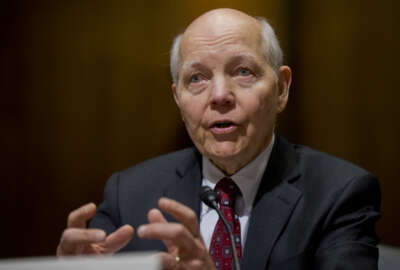

Washington's largest export may be advice from experts. Senior Correspondent Mike Causey says the warnings are often dire and involve something you are doing...
Washington is chock-full of experts on all subjects. Go into any Starbucks in town and you will encounter lots of VIPs and experts on every subject. We issue reports like Iowa grows corn.
Most of the reports are of the gloom-and-doom nature, because they get the most attention. Many are contradictory. But we carry on. Hence the warnings of the dangers of high oil prices (a major worry a few years back) have been replaced by the perils of oil prices that are too low. The saving grace is that each group of experts can say they were correct. Until they weren’t.
Hitting the Goldlocks sweet spot — not to hot, not too cold but just right — is tough. Which keeps the experts in business and saves them from having to get real jobs.
Experts who focus on the human operations (or lack of same) of the federal government fall into two categories:
But for both groups the problem is the same. That, if you were born between 1946 and 1964, the problem would be you. That you didn’t retire on their schedule is embarrassing to one group. That you haven’t gone quietly in the night means that many offices are suffering from hardening of the arteries because boomers aren’t as talented, flexible, cheerful, energetic and embracing as millennials. So what’s going on. How long are “you people” — the boomers — gonna continue to be a drag? We asked folks last week. And got a lot of interesting answers. Such as:
”I have over 40 years’ service, and I plan to retire toward the end of 2017.
“What might get me to retire sooner would be an offer of part-time retirement. Even though I am used to how bureaucracy operates, the idea of part-time retirement initially sounded like an ideal way to make the transition. I could test out having more free time and almost as much income, while the agency could keep me around longer to share whatever I have learned (aka “institutional knowledge”) in my 40 years.
“However, it is clear that bureaucratic inertia and risk-averse leadership has failed to recognize the potential benefits to the government , and of course to the employees who do the nation’s work.
“I can’t see a potential $25,000 buyout as being large enough to persuade me to go any time soon. So it looks like either a higher buyout, or implementation of part-time retirement are the most realistic options to nudge the NARFE generation toward the exit.”
” I’m retired military working for Defense. I have the age and years, but the 5 percent per year penalty for retiring before age 62 is holding me in place. I’m emotionally and financially ready except for the penalty-for-life. Eliminate it and a number of us will go.” — Roger.
“I could have retired years ago and there are other people in my offices in their late 60s and early 70s still working. Why? The cost of living in Long Island, New York! Maybe couples with two incomes can afford it, but not us singles with only one income. No raises for three years and a shutdown didn’t help either.” — Andrea Lembo
So give them a reason: A bigger buyout, penalty waiver or a few decent pay raises, and they’ll go and the experts can be proved correct.
Or not.
The Goldilocks zone in astrobiology describes the area around a star that is habitable.
Source: Wikipedia
Copyright © 2025 Federal News Network. All rights reserved. This website is not intended for users located within the European Economic Area.
Mike Causey is senior correspondent for Federal News Network and writes his daily Federal Report column on federal employees’ pay, benefits and retirement.
Follow @mcauseyWFED


